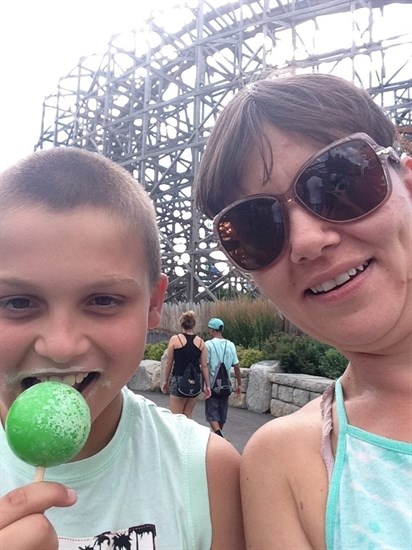
Brett and Lisa Watson.
Image Credit: Facebook
October 09, 2015 - 9:00 PM
KELOWNA - Autism is a condition everyone seems to have heard about but hardly anyone can define. Lisa Watson, who lives with it every day, says there’s a good reason for this.
“When you you’ve met one child with autism, you’ve met one child with autism, is how the saying goes. They are all so different, just like neuro-typical kids are all different.”
While Lisa talks, her son Brett, 11, plays on the floor of their suburban home, at first ignoring the visitor but then saying hi when mom prompts him.
It’s only when Brett says hello, his voice low and guttural, that one starts to realize something is amiss.
“We had him tested again last year. He has the cognitive ability of a three-year-old, his assessment came back with severe autism and global developmental delay,” Lisa says, without hesitation. “I would consider him verbal but severely delayed in his language skills.”
If Brett hears what his mother has just said, he shows no sign of it, instead doing what so-called neuro-typical kids will do — runs up and bugs mom for some junk food.
Autism is a neuro-developmental condition that manifests itself in many different ways and at many different levels from high-functioning to severely autistic. The latter is what Brett faces.
The main characteristics of the condition are impaired social interaction and repetative behehaviour, in addition to its effect on speech. Most parents of autistic children will notice the traits within the first two to three years of life as they fail to reach normal developmental milestones.
Lisa says Brett was typical in that sense.
“The language development wasn’t there. He was throwing tons of tantrums," she says. "When he went to preschool there was huge separation anxiety.”
It was a preschool teacher who had an autistic child of her own who finally convinced Lisa and Brett’s father to have him tested, even though she had begun to suspect something was wrong.
“You don’t want to believe it, I guess. She saw all these red flags and refered me to the child development centre," Lisa says. "If he hadn’t gone to preschool at that age, it could have taken even longer.”
While she seems matter-of-fact now, after eight years, Lisa says at the time she and her husband were devasted by the news, going through the typical pattern of guilt and self-blame, all while desperately searching for answers and a cure that wasn’t there.
“Autism is kind of trendy now, you know, but it’s not all like Rain Main,” says LIsa of the 1988 Hollywood movie starring Dustin Hoffman as an autistic savant with genius math skills.
Well-meaning people who first meet Brett will sometimes inquire of what his skill is, a pet peeve for Lisa, who points out autistic savants are an extreme minority of cases.
In the familiar setting of his home, with his routines in place, Brett doesn’t seem like much to handle but Lisa says it's an illusion.
“I always feel like I’m walking on eggshells, waiting for an erruption of some sort. Some days he’s great, easy-going, then other days he might be screaming or he will wake up tantruming, freaking out for no reason I can see and of course, he can’t tell me.”
But Watson doesn’t want pity, and points out that if life can sometimes be frustrating and exhausting living with Brett, it works both ways.
“I imagine his stress and frustration levels are pretty high as well," she says.
Lisa considers herself well-supported, both by the government and her ex-husband and admits to being a little embarrased by it.
“We’re almost the trendy disorder, the one that gets all the money,” she says, whereas some other less common developmental disorders may get little support.
Her worry for Brett is what happens when the government support drops at age 19 and well beyond that when she is gone herself or can no longer take care of him.
“I think most autistic adults would have a hard time fitting in and managing in a typical setting, not to mention finding a job or going to school," she says.
Her advice to parents newly informed of their child’s autism is to realize you are not alone and take advantage of all the support groups out there.
“There is strength in numbers and there is more of us out there than you think."
To contact the reporter for this story, email John McDonald at jmcdonald@infonews.ca or call 250-808-0143. To contact the editor, email mjones@infonews.ca or call 250-718-2724
News from © iNFOnews, 2015